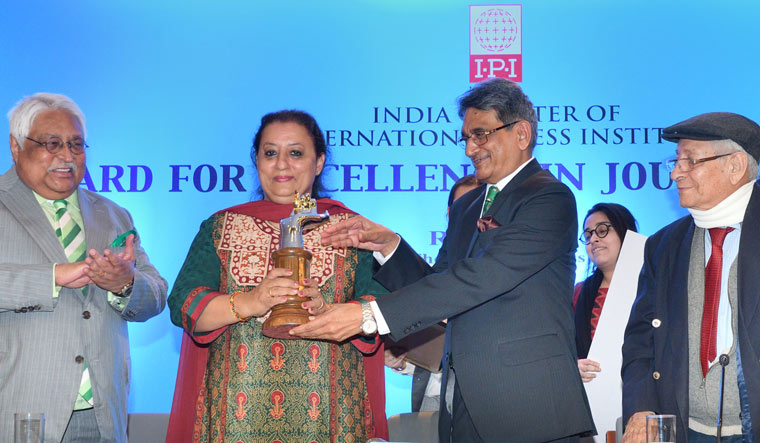Independent judiciary and independent media are the heart and soul of constitutional democracy, and when these two pillars are strong, the citizens feel empowered and their rights secured, said former chief justice R.M. Lodha.
It is the press ''which acts as a bridge between the government and the governed, exposing unethical, immoral and illegal behaviour by government officials, politicians, institutions and private individuals,'' said Justice Lodha at a function where he gave away the International Press Institute-India Award for Excellence in Journalism in 2017 to Ritu Sarin of The Indian Express.
''It has been rightly said that sometimes, journalists must be beyond their watchdog roles and for the sake of public interest or the public right to know, act as attack dogs to fish out from their hideouts, unscrupulous public servants, institutions and private individuals who circumvent morality for their selfish interest,'' said he.
Ritu Sarin was awarded for her outstanding revelations of Indian beneficiaries of offshore companies in the form of the Panama papers and for her long-standing contribution to investigative journalism. The award comprises a cash reward of Rs 2 lakh, a trophy and a citation.
Justice Lodha said that the Panama papers gave the story National and International reach and is claimed to be the biggest global information leak and largest collaborative investigations in journalism history.
“Hostility, threats and harassment on food choices, inter-religious marriages, creative art in the form of films and songs, transportation of cows of late have infected out country badly. They tend to crush the spirit of our constitutional freedoms. The growing tendency of criminalising the freedoms and unwarranted invocation of sedition and criminal defamation laws are not only disturbing, but they also destroy democratic credential of India as a nation. In many states, sedition charges are slapped at the drop of a hat despite clear guidelines laid down by the honourable Supreme Court,” said Justice Lodha.
Former Attorney General of India , Soli J. Sorabjee, who chaired the jury that selected the awardee, buttressed the point about freedom of press. ''In several decisions of the Supreme Court, freedom of press has been held to be implicit in the guarantee of freedom of speech and expression and has thus acquired the status of a fundamental right by judicial interpretation.''
However, he cautioned that no fundamental right, including freedom of the press, is absolute. ''It can be restricted provided the restriction is not excessive or arbitrary,'' he said. ''The question whether the restriction imposed is unreasonable, excessive or disproportionate has to be determined by an independent judiciary exercising the powers of judicial review,'' he added.
Sorabjee said that the press should incessantly preach the message that no group or body has the monopoly of truth and wisdom and that we must respect the point of view of the ''other minded''. ''The press must unequivocally condemn instances of intolerance without fear of adverse consequences,'' he said.
The IPI instituted the annual award in 2003 to recognise and honour the best work done by an Indian media organisation or journalist working in print, radio, television and internet mediums in furtherance of public interest including safeguarding of freedom of the press and other freedoms.
The Indian chapter of IPI is an active forum of editors, publishers and senior executives of newspapers, magazine and news agencies.
Philip Mathew, Fellow of the International Press Institute and editor of The Week, who welcomed the dignitaries said press freedom was in peril when the IPI was instituted seven decades ago and even today. “Governments in various parts of the world continue to display a love for restricting human freedoms and silencing journalists.
Pointing to the rising intolerance of dissent in the country, N. Ravi, chairman of IPI-India, said that “religious, caste and linguistic groups taking offence at some perceived slight and resorting to legal action or, worse, to violent protests and attacks is not a new phenomenon. But in recent times this tendency has taken on menacing proportions, with a proliferation of intolerant groups targeting journalists, writers, film makers, actors, artistes and ordinary people who have now been empowered by the Internet to voice their views. Both the scale of such targeting and the intensity of protests and violence have increased, with open and direct threats to lives being made with impunity.


